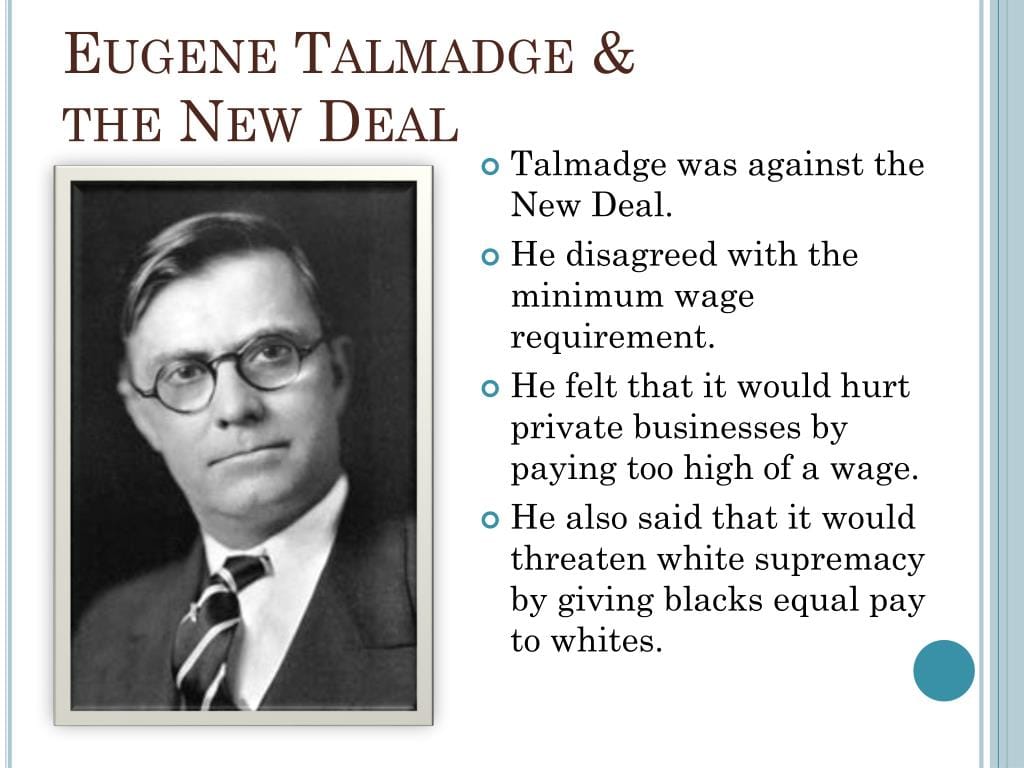Eugene Talmadge, a four-time Governor of Georgia, remains a controversial figure, celebrated by some as a champion of the common man and condemned by others as a symbol of racial oppression. His career, a tumultuous blend of populist appeal and staunch segregationism, left an indelible mark on Georgia’s political landscape. This article delves into the complexities of Talmadge’s life, exploring his rise to power, his controversial policies, and the enduring legacy of his paradoxical politics.
Early Life and Political Beginnings
Born near Forsyth, Georgia, on September 23, 1884, to Thomas R. and Carrie (Roberts) Talmadge, Eugene Talmadge’s early life likely instilled in him the values and struggles of rural Georgia. After earning a law degree from the University of Georgia in 1907, he briefly taught school before practicing law, experiences that may have shaped his understanding of the people he would later represent. His political career began in 1927 when he was elected Georgia’s Commissioner of Agriculture. Holding this position until 1933, Talmadge became a vocal advocate for small farmers while simultaneously implementing discriminatory policies that resonated with his base of rural white voters. This period laid the groundwork for his gubernatorial ambitions and foreshadowed the controversial policies that would define his time in office.
The Governor’s Mansion and the Rise of a Segregationist
Talmadge’s gubernatorial campaigns were masterclasses in populist rhetoric, effectively targeting the anxieties of white rural voters during the Great Depression. He presented himself as a bulwark against the perceived threats of federal intervention, economic hardship, and racial integration, skillfully tapping into the resentment felt by many towards the perceived elite. This strategy propelled him to victory in the gubernatorial elections of 1933, 1934, and 1940, and remarkably, even posthumously in 1946. His time as governor, however, was punctuated by controversy. A staunch segregationist, Talmadge vehemently opposed any efforts towards racial equality, often employing inflammatory language and actively resisting integration. He viewed the New Deal programs of Franklin D. Roosevelt as a dangerous overreach of the federal government, further solidifying his image as a defender of traditional values and states’ rights. While popular among many white Georgians, his policies perpetuated racial injustice and solidified Georgia’s reputation as a bastion of inequality.
The Cocking Affair: A Flashpoint in Higher Education
The Cocking Affair of 1941 epitomizes Talmadge’s authoritarian tendencies and his unwavering commitment to segregation. Accusing Walter Cocking, the dean of the University of Georgia’s College of Education, of promoting integration, Talmadge pressured the Board of Regents to fire Cocking and two other administrators. This action resulted in the loss of accreditation for the University System of Georgia, drawing widespread national condemnation. This incident underscores Talmadge’s willingness to prioritize his segregationist agenda, even at the expense of the state’s educational institutions. The Cocking Affair remains a controversial chapter in Georgia’s history, prompting ongoing debate about academic freedom, political overreach, and the role of education in a segregated society.
The Three Governors Controversy: A Constitutional Crisis
Eugene Talmadge’s death in December 1946, shortly before his fourth term was to begin, triggered an unprecedented constitutional crisis known as the “Three Governors Controversy.” Three men – his son, Herman Talmadge; outgoing Lieutenant Governor Melvin E. Thompson; and outgoing Governor Ellis Arnall – each claimed the governorship, leading to a period of intense political and legal wrangling. The Georgia Supreme Court ultimately ruled in favor of Thompson, but the controversy exposed deep divisions within the state’s Democratic party and highlighted ambiguities in the state constitution’s succession clause. This episode underscores the complex and often volatile nature of Talmadge’s legacy and its enduring impact on Georgia politics. For a more detailed look at the Fort Berthold Reservation and its significance, see [https://www.lolaapp.com/fort-berthold-reservation].
A Complicated Legacy
Eugene Talmadge’s legacy is complex and multifaceted, a blend of populism, segregation, and political maneuvering. While he championed the concerns of rural white voters and fiercely defended states’ rights, his staunch segregationist views and authoritarian tendencies cast a long shadow over his accomplishments. His legacy continues to be a source of both pride and shame for Georgians, prompting ongoing debate and reflection.
Assessing the Impact
Some view Talmadge as a hero who gave voice to the common man and protected Georgia’s interests. Others see him as a demagogue who exploited racial prejudices and obstructed progress. His legacy touches upon several key aspects of Georgia’s history:
- Populism: Was he a true champion of the common man or a skilled manipulator who exploited anxieties for political gain?
- Segregation: Did he reflect the prevailing views of his constituents or actively exacerbate racial tensions for his own benefit?
- States’ Rights: Was his defense of states’ rights principled or a convenient shield for discriminatory practices?
Ongoing Research and Evolving Interpretations
Historians and political scientists continue to grapple with the complexities of Talmadge’s legacy. Ongoing research explores the nuances of his career, including possible involvement in a 1946 lynching investigation, though direct involvement was never definitively proven. As new evidence emerges and perspectives evolve, our understanding of this paradoxical figure will likely continue to shift. Some experts believe that his opposition to the New Deal, while popular with his base, may have hindered Georgia’s economic development in the long run. Others suggest his emphasis on states’ rights laid the groundwork for later resistance to the Civil Rights Movement. These ongoing discussions highlight the importance of continuous historical inquiry and the challenges of assessing controversial figures in their proper historical context. Talmadge’s story serves as a stark reminder of the enduring impact of political leaders, for better or for worse, and the importance of grappling with their complex legacies.
- Unlock Water’s Symbolism: A Cross-Cultural Exploration - April 20, 2025
- Identify Black and White Snakes: Venomous or Harmless? - April 20, 2025
- Unlocking Potential: Origins High School’s NYC Story - April 20, 2025















